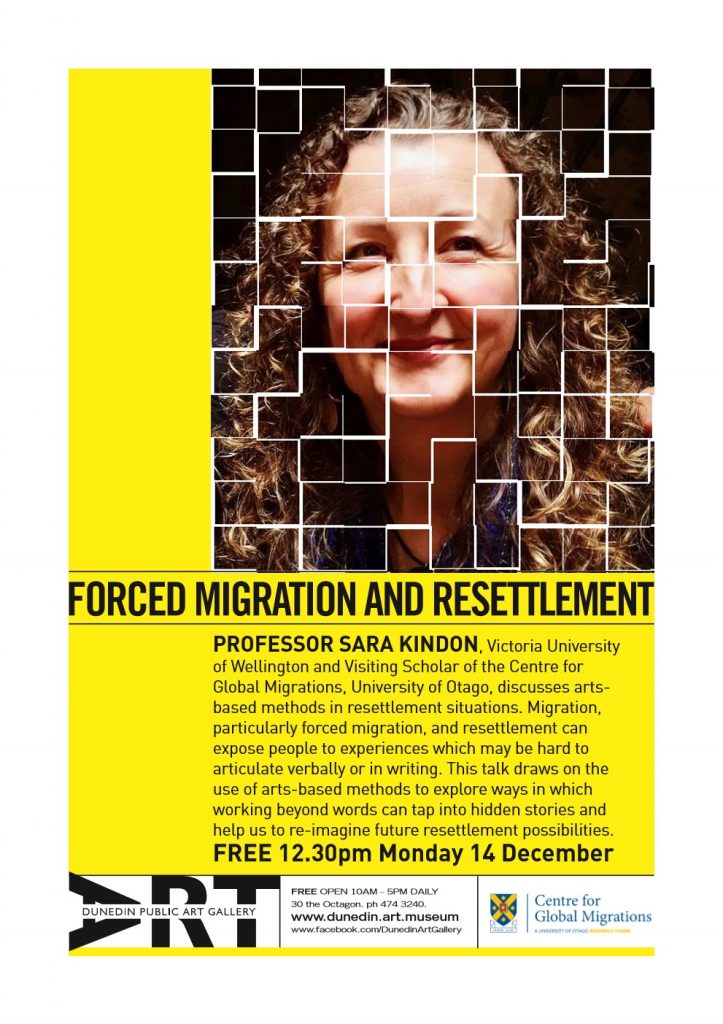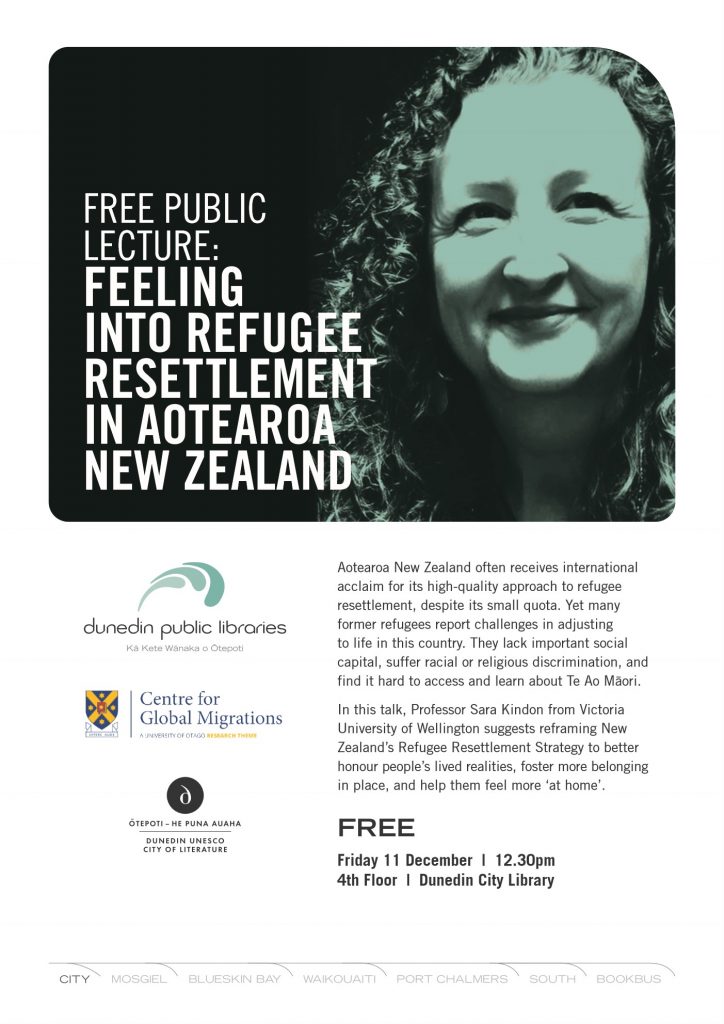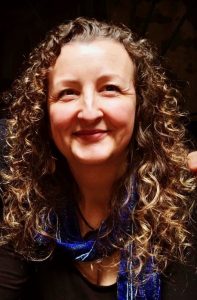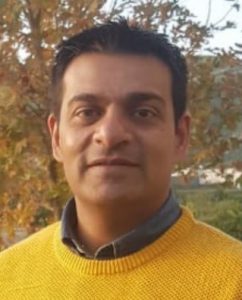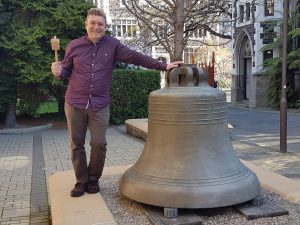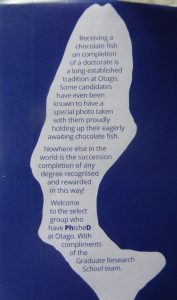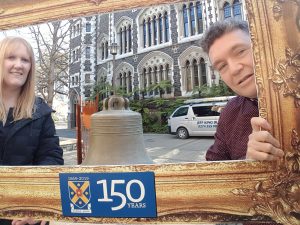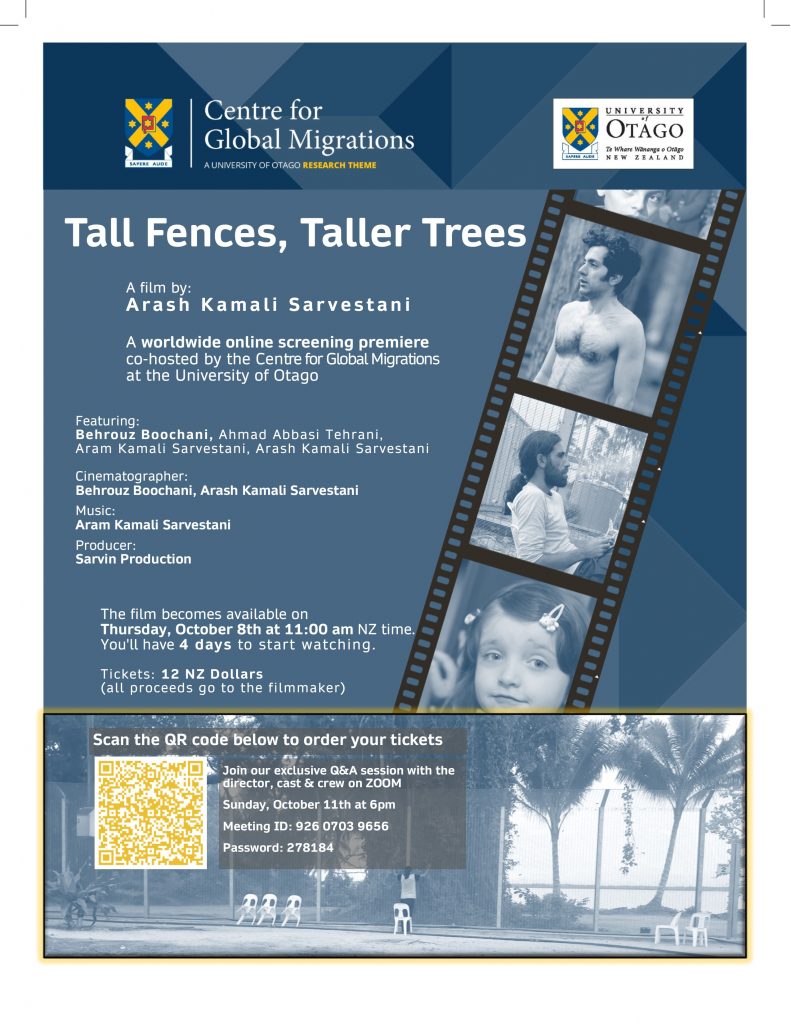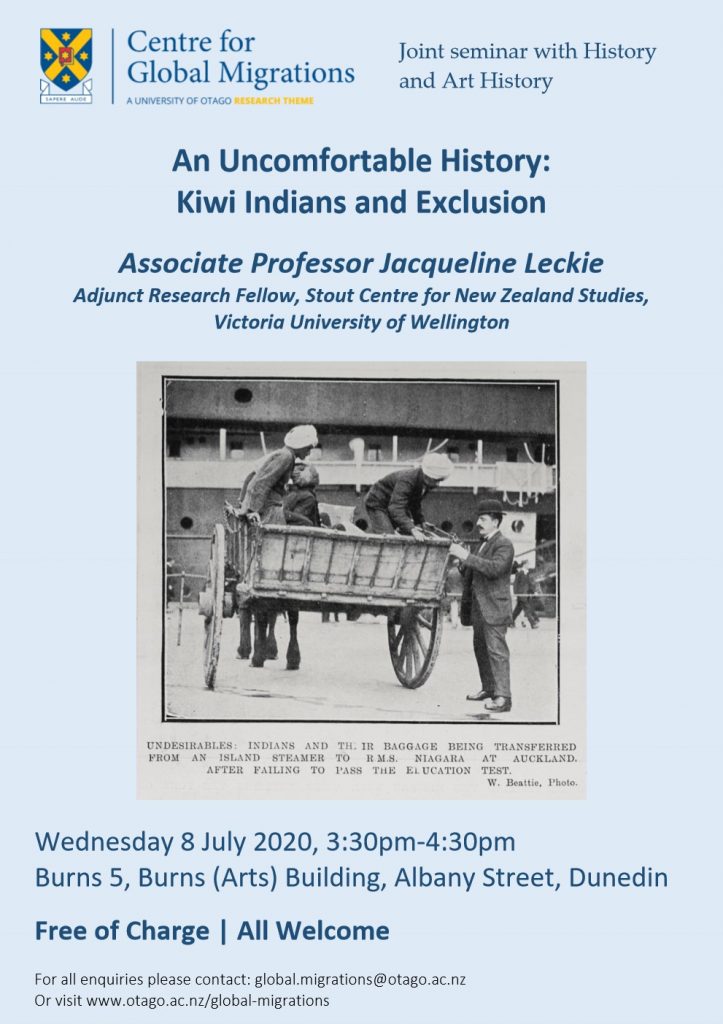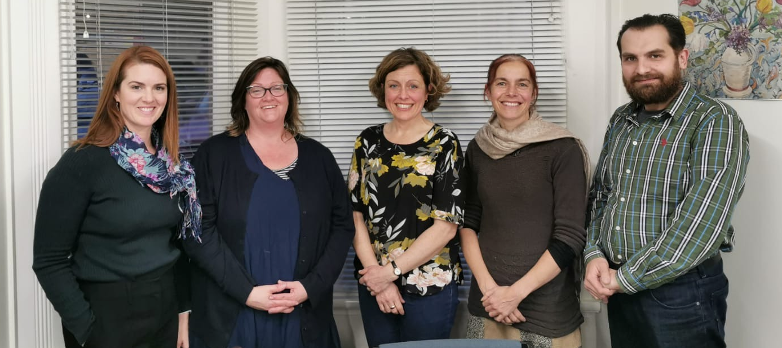Public Lecture: Re-imagining Resettlement Practice through Arts-based Methods
Free Public Lecture
Re-imagining Resettlement Practice through Arts-based Methods
Professor Sara Kindon
Victoria University of Wellington
Monday 14 December 2020, 12.30-1.30pm
Dunedin Public Art Gallery
Migration, particularly forced migration, and resettlement can expose people to experiences which may be hard to articulate verbally or in writing, particularly if the vehicle of communication is in a second or third language. Yet finding ways to enable people to process and express challenging experiences can aide in their resettlement by supporting greater resilience and wellbeing.
This talk from Professor Sara Kindon of Victoria University of Wellington, who is the Centre for Global Migrations’ 2020 Visiting Scholar, draws on the use of arts-based methods to explore ways in which working beyond words can tap into hidden stories and help us to re-imagine future resettlement possibilities.
Public Lecture: Feeling into Refugee Resettlement in Aotearoa New Zealand
Free Public Lecture
Feeling into Refugee Resettlement in Aotearoa New Zealand
Professor Sara Kindon
Victoria University of Wellington
Friday 11 December 2020, 12.30-1.30pm
Dunningham Suite, Floor 4, Dunedin Public Library, Moray Place
Aotearoa New Zealand often receives international acclaim for its high-quality approach to refugee resettlement, despite its small quota. The country’s refugee resettlement strategy is also recognised for attending to important dimensions of life: self sufficiency, health, education, housing and political participation, and is supported by cross-sectoral work between government and non-government actors. Despite these efforts, however, and the formidable resilience and strengths of many former refugees, many ‘new Kiwis’ report challenges in adjusting to life in this country. They lack important social capital, suffer racial or religious discrimination, and find it hard to access and learn about Te Ao Māori.
This public lecture from Professor Sara Kindon, the Centre for Global Migrations’ 2020 Visiting Scholar, questions what might be missing from the NZ Refugee Resettlement Strategy as it is currently conceived. Drawing on research as well as anecdotal reflections by resettlement support workers, the talk queries how reframing New Zealand’s strategy may better honour people’s lived realities, foster more belonging in place, and help them to feel more ‘at home’.
2020 Visiting Scholar: Professor Sara Kindon
We are delighted to announce that our 2020 Visiting Scholar is Professor Sara Kindon, Professor in the School of Geography, Environment and Earth Sciences at Victoria University of Wellington. Professor Kindon will work with our member Dr Vivienne Anderson to advance a co-authored article on advocacy research with refugee-background students transitioning into and through tertiary education, and run an advocacy workshop.
During her time in Dunedin, Professor Kindon will give two public talks. The first will reflect on New Zealand’s Refugee Resettlement Strategy while the second discusses arts-based methods in resettlement situations. Further details will follow soon.
New Project: Exploring Refugee Access to Primary Healthcare Services in Aotearoa
Refugees represent a diverse group of displaced individuals with unique health issues and disease risks. New Zealand has long been accepting refugees from countries such as Afghanistan, Bhutan, Somalia, Ethiopia, Sudan, Iraq, Myanmar, and Syria. Since 2016 more people who have had to flee conflict in Syria, Palestine and Iraq have arrived. Although New Zealand has a well-designed resettlement program for refugees that includes initial health screening and later access to funded health care, data on the experience of refugees with the New Zealand health care system is scarce.
Funded by the Health Research Council, this research activation project aims to develop relationships with the recent refugee communities/community from Arabian countries who have made their home in Wellington and Dunedin. Led by Dr Mudassir Anwar, the project team is keen to work with these communities to establish their primary health care needs, how these are currently being fulfilled, and what barriers they have experienced in accessing health care.
For further details contact Dr Mudassir Anwar.
Submission of PhD thesis on Global Orangeism
Congratulations to our postgraduate member Patrick Coleman on the submission of his PhD thesis on the global Orange Order.
In keeping with Otago tradition, Patrick (accompanied by his supervisor Professor Angela McCarthy) collected his chocolate fish and card from the Graduate Research School and then proceeded to the Clocktower Building to borrow the recycled rimu mallet to ring the University bell.
We wish Patrick well for the examination process.
Online Film and Q&A
Tall Fences, Taller Trees
A film by Arash Kamali Sarvestani (director of Chauka, Please Tell Us the Time)
Featuring: Behrouz Boochani, Ahmad Abbasi Tehrani, Aram Kamali Sarvestani, Arash Kamali Sarvestani.
The film features a multi-layered narrative of migration and reflects on the methodologies used in making Chauka. The film also features Behrouz Boochani as the main character and includes some unique shots from Manus prison.
Please join us for this worldwide online screening premiere and exclusive Q&A session with the director, cast and crew on Zoom (chaired by Dr Pooneh Torabian, University of Otago). Q&A participants include Arash Kamali Sravestani (director), Aram Kamali Sarvestani (composer), Dr Neil Vallelly, and Dr Freya Higgins-Desbiolles.
Film Screening: From Thursday 8 October 2020 at 11am New Zealand Time (film available for 4 days)
Exclusive Q&A Session: Sunday 11 October at 6pm New Zealand Time.
Please see the poster below for further details or this link.
These special events have been organised by Dr Ali Mostolizadeh in co-ordination with Arash Kamali Sarvestani.
Publication: Open and Closed Borders: The Geopolitics of Migration
We are happy to announce the e-publication of Open and Closed Borders: The Geopolitics of Migration: Proceedings of the 52nd Otago Foreign Policy School, 30 June – 2 July 2017. The publication, edited by Jacqueline Leckie and Angela McCarthy, features transcripts of 12 papers from scholars, government officials, and activists on topics including: borders, migration policies, deportations, displacement, trafficking, modern slavery, racism, detention, and labour mobility.
The publication can be downloaded for free on our website: https://www.otago.ac.nz/global-migrations/otago743140.pdf
Contents
1. The High Politics of International Migration in the Twenty-First Century: Sketching an Update of The Age of Migration (Mark Miller)
2. Border as Method to Investigating Logistics (Brett Neilson)
3. Forced Return: The Massive Deportation of Mexican Immigrants from the United States in the Trump Era (Rafael Alarcón Acosta)
4. Responding to Human Displacement Through Regional Arrangements in the Asia-Pacific Region (Paris Aristotle)
5. Looking Forward: Responding to Protracted Refugee Displacement (Jennifer Hyndman)
6. The Global Crisis of Refugees and Conflict Displacement: Challenges, Opportunities and Responsibility by the International Community (Maya Ameratunga)
7. Human Trafficking and Smuggling in the 21st Century: A Perspective on Trans-Disciplinary Cooperation (Thanh-Dam Truong)
8. Bali Process: Regional Responses to Modern Slavery, Human Trafficking and People Smuggling (Andrew Goledzinowski)
9. The Apollonian Muslim (Yassir Morsi)
10. Beyond Force or Choice: The Frictions and Fantasies of Mobility in the Pacific (Yvonne Underhill-Sem)
11. Tulele Peisa: Sailing the Waves on our Own (Ursula Rakova; presented by Jenny Bryant-Tokalau)
12. Detention Centres: Public Accountability in Australia? The Practice of Forced Exclusion and Punishment of Selected Asylum Seekers (Wendy Bacon)
Seminar: An Uncomfortable History: Kiwi Indians and Exclusion
Free Seminar
An Uncomfortable History:
Kiwi Indians and Exclusion
Associate Professor Jacqueline Leckie
Stout Research Centre for New Zealand Studies
Victoria University of Wellington
Wednesday 8 July 2020, 3:30pm
Burns 5 Lecture Theatre, University of Otago
In collaboration with the New Zealand Indian Central Association, Associate Professor Leckie is producing a brief history of Indian exclusion and discrimination in Aotearoa. After the 15 March 2019 Christchurch mosque massacre, Prime Minister Jacinda Ardern declared that this ‘is not us’. Yet the tragedy pointed to the presence of white extremism and tacit or unintentional support within Aotearoa. 15 March raised manifold questions about what it means to belong to an ethnic and religious minority in a country that has experienced a very long history of underlying prejudice and racism. This is not a history of celebration or integration, but outlines the discrimination Kiwi-Indians have faced, to recognise and address the nation’s uncomfortable history. It can be tempting to dismiss past anti-Asian rhetoric as crackpot, but it is too easy to sweep this history under the carpet, and to do the same with contemporary racism directed at Indians. Aotearoa’s legacy of exclusion towards Kiwi-Indians — sometimes overt but often in less sensational ways — problematises if the nation is genuinely inclusive.
This talk is co-hosted by the Centre for Global Migrations and History Programme at the University of Otago.
Refugee-Background Students in Aotearoa Project
A cross-sector team led by Vivienne Anderson from the University of Otago’s Higher Education Development Centre have gained funding from the NZ Council for Educational Research to carry out a three-year participatory action research (PAR) project with refugee-background young people living in Otago/Southland. The project team will work with the young people to:
- examine how they imagine, experience, navigate and negotiate the secondary-tertiary education border,
- identify strengths-based, student-centred approaches that foster their educational and transition success, and
- develop student-centred transition resources for other young people from refugee backgrounds, and their families and educational institutions.
Since this is a PAR project, students are co-researchers with the research team. Data are generated through research hui (interactive workshops) held during term breaks. In 2020 and 2021, participating students are in Year 12 and 13, and in 2021 and 2022, they will be in their first year of tertiary study. Initially, we used ‘mapping’ as a way of inviting students to reflect on their educational pathways to date and their educational aspirations. In future hui, we will work with the students to identify pathways and relevant information sources based on their aspirations, reflect on alternative possibilities, and re-evaluate aspirations if necessary. The students will work with us to develop creative resources for families, schools and other students and educational institutions, based on their experiences in our project, and personal transition journeys.
The wider research team includes Sayedali Mostolizadeh and Jo Oranje (University of Otago), Amber Fraser-Smith (Otago Polytechnic), Pip Laufiso (Ministry of Education), Angela Watts (Carisbrook School), Jarrah Cooke (NZ Red Cross) and Rachel Rafferty (University of Derby). Monica Cruz and Ala Ghandour provide bilingual support/research assistance.
Click here for the project website.
Team members: Penny Kersahw, Jo Oranje, Viv Anderson, Amber Fraser-Smith, and Ali Mostolizadeh (absent: Jarrah Cooke and Pip Laufiso).
Workshop on overseas educated nurses in New Zealand
EVENT POSTPONED
Workshop
‘For whose care? A Multidisciplinary Workshop on Overseas Educated Nurses in New Zealand’s Elderly Care Sector’
Wednesday 25 March 2020, 12-1pm
Room 1.21, Hunter Centre, 279-281 Great King Street, Dunedin
In New Zealand, one of the more popular pathways for overseas educated nurses to gain qualifications in New Zealand is to initially work in elderly care homes as care workers. While they help supplement the care workforce, there remains concerns about retaining those nurses with appropriate qualifications and competencies required by the New Zealand health system, especially in view of changes in public policy in health, education and migration.
The tasks of this workshop are two-fold: first, we examine and weigh the advantages and disadvantages of employing and retaining overseas-educated nurses with qualifications either or in both the home country and New Zealand, from the perspectives of both the nurses themselves and the elderly care homes, and against the background of the existing and changing public policies. Second, we attempt to explore strategies that would enable elderly care homes to meet its long-term needs for care workers, perhaps through encouraging foreign-educated, New Zealand-qualified nurses to stay (retention incentives and policies), and by adopting alternative recruitment schemes attracting the wider migrant worker population.
Through these exercises, we hope to provide some policy suggestions for both New Zealand and Japan in terms of how to sustain the intensifying demand for skilled care workforce by tapping the various categories of the migrant population and providing effective job retention incentives.

